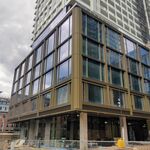Ore
New Member
Buyers hit with big bills for surprise adjustments
November 7, 2009
Bob Aaron
As many as 244 purchasers received a nasty surprise at the end of September when they got hit with thousands of dollars in "fictitious" charges on final closing of their new condominium units.
The development in question is a 244-unit medium-rise building near Warden Ave. and Enterprise Dr. in Markham.
The builder's agreement of purchase and sale contains an escalation clause typical of those used by local builders.
The clause contemplates that prior to final closing, there may be increases in the municipal levies or development charges, which were in place prior to construction.
The agreement states that in the event there is an increase in any of these existing levies after the day the document has been signed, "the purchaser shall pay the increase to the existing levy ... as an adjustment" to the builder on closing.
This means that the purchasers have to pay the builder the amount of increases in any government charges, which come into effect between signing and closing. Of critical importance, the clause is silent on whether the purchasers must reimburse the builder only for increases actually paid by the builder, or as well for increases imposed by the Town but from which the builder is exempt because the levies were prepaid.
Toronto lawyer Stephen Shub represented a number of purchasers in the Markham project. He told me that on closing, all of his clients were shocked to see that they were being charged between $7,680 and $11,283 for increases in existing levies.
A schedule attached to the builder's statements of adjustments for each purchaser detailed the amount of levy increase charged.
Shub discovered that the builder had not actually paid the amounts set out in the schedule. At the time the building permits were issued in May 2007, the builder had prepaid less than $300 in levies for each unit. When the town subsequently imposed thousands of dollars in higher levies, the builder did not have to pay those amounts because the increases were not retroactive.
On behalf of his clients, Shub took the position that the builder had no right to charge purchasers for levies it had neither incurred nor paid. The disputed clause in the agreement, he said, "can only apply to monies paid by the builder to the Town of Markham and not to monies never paid by the builder."
Despite Shub's objections, the builder insisted it was entitled to recover levy increases that had been implemented by Markham but that it had not been required to pay.
In a letter to Shub, Michael C. Volpatti, solicitor for the builder, said that the purchase agreement entitled the builder to charge purchasers for "any new levy" after the date the agreement was signed, and "without regard to the date of payment" by the builder.
Translated from legalese, the builder's position is that, according to the agreement, it has the right to recover any new levies, including those that it was in fact exempt from.
Eventually Shub closed the transactions on behalf of his purchasers, and the amounts in dispute are being held in trust by the builder's lawyer until further resolution.
In a detailed letter to me, Shub estimated that the builder has pocketed as much as $2 million in "unreal, exaggerated, surprise closing adjustments" from 244 "unsuspecting buyers."
To make matters worse, the buyers had to come up with the cash for these charges, and could not add them to their mortgages.
Calling the builder's actions a "rip-off," Shub wants builders to commit to voluntary upfront disclosure of all closing adjustments. He also calls for regulatory intervention by the Ontario government so that builders will not spring "surprise attacks on the unsuspecting public."
I agree with him. Any attempt to force purchasers to pay thousands of dollars in fictitious charges does no credit to the public image of Ontario's homebuilders.
http://www.yourhome.ca/homes/columnsblogs/article/721269--buyers-hit-with-big-bills-for-surprise-adjustments
November 7, 2009
Bob Aaron
As many as 244 purchasers received a nasty surprise at the end of September when they got hit with thousands of dollars in "fictitious" charges on final closing of their new condominium units.
The development in question is a 244-unit medium-rise building near Warden Ave. and Enterprise Dr. in Markham.
The builder's agreement of purchase and sale contains an escalation clause typical of those used by local builders.
The clause contemplates that prior to final closing, there may be increases in the municipal levies or development charges, which were in place prior to construction.
The agreement states that in the event there is an increase in any of these existing levies after the day the document has been signed, "the purchaser shall pay the increase to the existing levy ... as an adjustment" to the builder on closing.
This means that the purchasers have to pay the builder the amount of increases in any government charges, which come into effect between signing and closing. Of critical importance, the clause is silent on whether the purchasers must reimburse the builder only for increases actually paid by the builder, or as well for increases imposed by the Town but from which the builder is exempt because the levies were prepaid.
Toronto lawyer Stephen Shub represented a number of purchasers in the Markham project. He told me that on closing, all of his clients were shocked to see that they were being charged between $7,680 and $11,283 for increases in existing levies.
A schedule attached to the builder's statements of adjustments for each purchaser detailed the amount of levy increase charged.
Shub discovered that the builder had not actually paid the amounts set out in the schedule. At the time the building permits were issued in May 2007, the builder had prepaid less than $300 in levies for each unit. When the town subsequently imposed thousands of dollars in higher levies, the builder did not have to pay those amounts because the increases were not retroactive.
On behalf of his clients, Shub took the position that the builder had no right to charge purchasers for levies it had neither incurred nor paid. The disputed clause in the agreement, he said, "can only apply to monies paid by the builder to the Town of Markham and not to monies never paid by the builder."
Despite Shub's objections, the builder insisted it was entitled to recover levy increases that had been implemented by Markham but that it had not been required to pay.
In a letter to Shub, Michael C. Volpatti, solicitor for the builder, said that the purchase agreement entitled the builder to charge purchasers for "any new levy" after the date the agreement was signed, and "without regard to the date of payment" by the builder.
Translated from legalese, the builder's position is that, according to the agreement, it has the right to recover any new levies, including those that it was in fact exempt from.
Eventually Shub closed the transactions on behalf of his purchasers, and the amounts in dispute are being held in trust by the builder's lawyer until further resolution.
In a detailed letter to me, Shub estimated that the builder has pocketed as much as $2 million in "unreal, exaggerated, surprise closing adjustments" from 244 "unsuspecting buyers."
To make matters worse, the buyers had to come up with the cash for these charges, and could not add them to their mortgages.
Calling the builder's actions a "rip-off," Shub wants builders to commit to voluntary upfront disclosure of all closing adjustments. He also calls for regulatory intervention by the Ontario government so that builders will not spring "surprise attacks on the unsuspecting public."
I agree with him. Any attempt to force purchasers to pay thousands of dollars in fictitious charges does no credit to the public image of Ontario's homebuilders.
http://www.yourhome.ca/homes/columnsblogs/article/721269--buyers-hit-with-big-bills-for-surprise-adjustments




